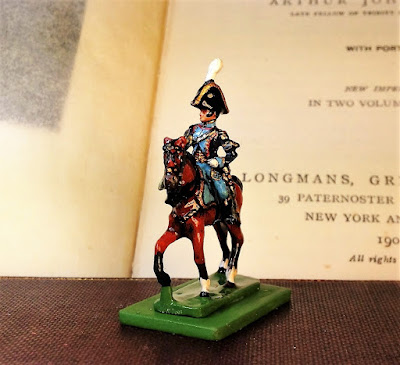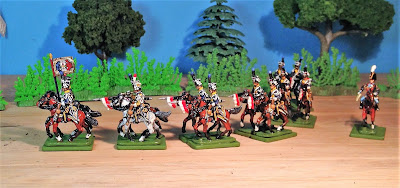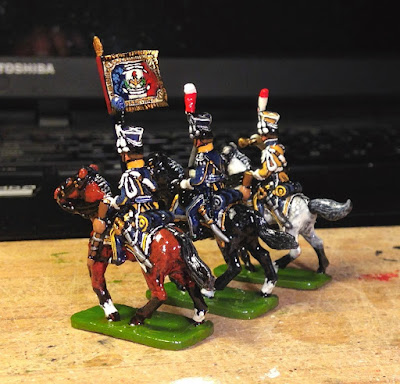 |
| Marbot: "He looks nothing like me!" |
Although the lancers are progressing, they're not quite ready for their show-and-tell session.
What I have instead is my latest French command figure. He's the David Clayton version of Hinton Hunt
FN 371: Aide de Camp, holding a letter, on horse
FNH 13. He's a beautiful casting. His horse is also very fine, albeit a little on the slim side.
Marcus Hinton didn't specify his identity, but for me there can be no doubt. He is Jean Baptiste Antoine Marcellin de Marbot, ADC and beau sabreur par excellence!
 |
| Marbot poses for his close-up. |
I chose him once I belatedly cottoned-on that my combined voltigeurs are going to need a commander every time they fight in close order. As it is likely to be only an occasional command, an Aide de Camp seemed the ideal choice.
He's painted almost exactly as recommended in Marcus Hinton's painting instructions (which the
Hinton Hunter has published
here). It's the uniform worn by the well-dressed ADC to a general in about 1810, if my interweb searches are anything to go by. Something very similar is also depicted in one of Fred and Liliane Funcken's books.
 |
| Just don't call me Gerard |
Born in 1782 and eventually rising to the command of a brigade at Waterloo, Marbot would probably have remained in obscurity had it not been for the publication of his memoirs, to great literary acclaim, in 1891. In the words of the ever reliable Wikipedia, "to ordinary readers and to students of history alike, these give a picture of the Napoleonic age of warfare which for vividness and romantic interest has never been surpassed."
 |
| Very Flashy! |
Indeed, Marbot's escapades were so sensational that their authenticity was immediately questioned, and to this day scholars doubt the veracity of many of his tales. They are also (in places, one suspects, unintentionally) extremely funny, and thus ripe for satire.
Certainly Arthur Conan Doyle thought so. The result, beginning in 1894, was a series of short stories published in
The Strand magazine charting the outrageous exploits of one Brigadier Etienne Gerard, an officer in the Emperor's hussars. Gerard's outstanding character traits are vanity, indomitable courage, unshakable loyalty and the most amazing stupidity. His adventures, needless to say, are utterly glorious.
Brigadier Gerard was in turn a major influence on George McDonald Fraser's brilliantly funny fictional adventurer, Harry Flashman. There's also not a little of Marbot, I think, in Rik Myall's superbly over-the-top "Flasheart" character in the BBC
Blackadder series.
I hope you like him.
WM











